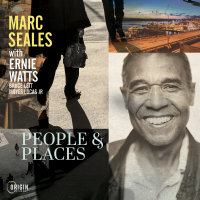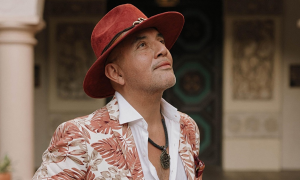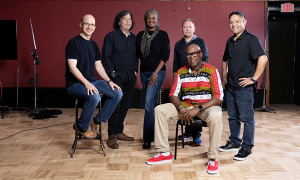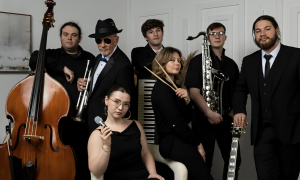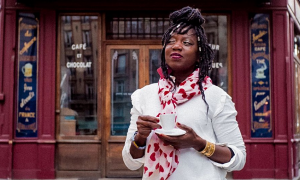Home » Jazz Articles » Take Five With... » Take Five With Phil Cavalieri
Take Five With Phil Cavalieri
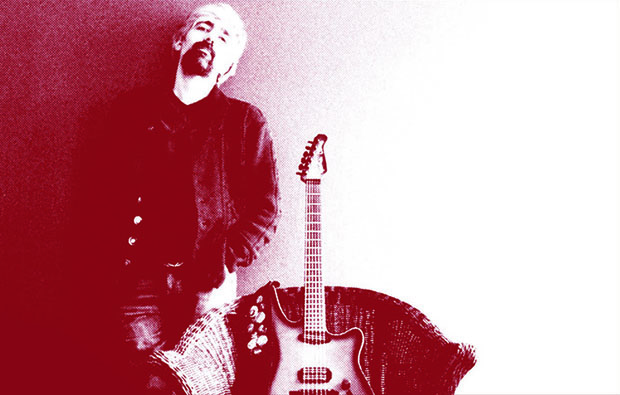
Born in 1974, Filippo "Phil" Cavalieri grew up in an era where jazz-rock was at its peak. His formative musical years took place in Ferrara, Italy, where he played in the clubs with all kinds of bands playing everything from

Jimi Hendrix
guitar, electric1942 - 1970
Phil finished school and then moved to Holland, where he studied and played with different jazz players like Jan Kuiper, Winfred Buma and Leonardo Amuedo, and attended workshop by

John Abercrombie
guitar1944 - 2017

Charlie Haden
bass, acoustic1937 - 2014

Scott Henderson
guitar
Gary Willis
bassb.1957

John Taylor
piano1942 - 2015
Cavalieri started to play as pro in different bands around Italy in the mid-'90s and, since then, has proven himself as a world-class player and composer. In 2000, he started to play and compose with an independent label called Stranisuoni and worked in different projects with the Italian pop singer Luca Bui, bringing his new tunes to a national broadcast. After this experience of commercial music he turned back to jazz and started again with a new series of studies that took him far from the music for a full immersion research in how to create a personal way of playing and compose. He attended classes by a new generation Italian jazz players like Paolo Ghetti and Fabio Petretti, and graduated with a study of

John Scofield
guitarb.1951
Cavalieri's new way as independent artist started with a new composition that reflected the interest of the outside playing of Scofield and recent
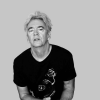
Wayne Krantz
guitar, electricHe currently teaches at Ferrara Music school of Modern Music and he is now writing his method of outside playing for fusion jazz guitarists, a revolutionary way for students to study the pluralities of outside playing with guitar.
Instrument(s):
Guitar.
Teachers and/or influences?
Leonardo Amuedo, John Scofield, Wayne Krantz, Scott Henderson, Jerry Garcia, Santana.
I knew I wanted to be a musician when...
When I was 16 I understood that I liked jazz more than other music, and I wanted to figure out what was inside that beautiful and difficult music that changed my way of look at it...and the guitar.
Your sound and approach to music:
My music often looks for outside elements both in melodies and solos. The most important thing is to build a strong theme; that, for me, is the strongest elements in a song. By the way, the rhythmic elements must rule in the solo, where the music must be made, not only with scales, but first of all with intervals used in rhythmic combinations.
Your teaching approach:
I want to build awareness in every student about the musical elements they like. They must learn the scales and the modes but first of all they must try to figure out their personal way of doing things, which can be even harder. I don't want to listen to students that play in the same way; they must understood what they like in other musicians and find what they can use in their own way, even for solos and writing.
Your dream band:

Buddy Rich
drums1917 - 1987

Marcus Miller
bassb.1959

Chick Corea
piano1941 - 2021
Your favorite recording in your discography and why?
Shakti—I love

John McLaughlin
guitarb.1942

Tom Harrell
trumpetb.1946
The first Jazz album I bought was:
A big band vinyl album; I don't remember the title any more, but I was 14 years old and I thought it was such a cool sound.
What do you think is the most important thing you are contributing musically?
I think that I'm trying my best to play without trying to sound like any other player. It's so difficult; I'm certain that only this can help bring out new music from my strings. I think that searching for new music is endless work, but I want to shoot myself, as in a photograph, during this musical process, and I hope to find people that want to listen to my ideas and who might join me in this kind of project.
CDs you are listening to now:
Mostly A lot of Wayne Krantz, especially
How would you describe the state of jazz today?
There's a lot of potential, and I think the net can help many musicians bring their music to larger audience—people who can finally find their work and hear it. Jazz played by famous artists is fantastic, of course, but we must always be on the lookout for alternative players—especially for Italy.
What are some of the essential requirements to keep jazz alive and growing?
Independent music probably is the heart of jazz; even though we have a lot of wonderful famous musicians we must look for new generations that want to let jazz survive in the digital era and bring new directions because I think it is necessary, in order to once again understand the past life of this music.
What is in the near future?
I want to promote my new album,
If I weren't a jazz musician, I would be a:
I always thought that if I wasn't playing guitar, I'd probably be an organist because I love that instrument top. I never really think about doing something other than playing music.
Photo Credit
Courtesy of

Phil Cavalieri
guitar, electricb.1974
Tags
Phil Cavalieri
Take Five With...
United States
Jimi Hendrix
John Abercrombie
Charlie Haden
Scott Henderson
Gary Willis
John Taylor
John Scofield
Wayne Krantz
Buddy Rich
Marcus Miller
Chick Corea
john mclaughlin
Tom Harrell
Comments
PREVIOUS / NEXT
Support All About Jazz
 All About Jazz has been a pillar of jazz since 1995, championing it as an art form and, more importantly, supporting the musicians who make it. Our enduring commitment has made "AAJ" one of the most culturally important websites of its kind, read by hundreds of thousands of fans, musicians and industry figures every month.
All About Jazz has been a pillar of jazz since 1995, championing it as an art form and, more importantly, supporting the musicians who make it. Our enduring commitment has made "AAJ" one of the most culturally important websites of its kind, read by hundreds of thousands of fans, musicians and industry figures every month.







 Buy Now
Buy Now



